(This post contains affiliate links. Please see my disclosure statement for more information).
Let me start
by saying I’m not a fan of using food for kids’ arts and crafts. I’m not soap
box-y about it or anything, but I try (emphasis on try) to stick to what I get
at the craft store. Even so, I really don’t look at marshmallow fluff as food.
While it technically is (you put it in your mouth, chew it and digest it), the
ooey, gooey stuff has no real nutritional value and isn’t exactly my number one
pick for my son’s school lunch – even though it might be his.
I’ve been
trying to cut back on my sugar intake, and needed something else to do with the
fluff in my pantry (I felt guilty tossing it in the trash). The whipped texture
may be sticky, but is a pretty cool texture to use for a DIY kids’ paint. Not
only is it an easy base for finger paint, but it also smells amazing and is
taste-safe for little ones.
This
activity allows your child to explore the painting process, discover different
textures and mix colors. Let’s start with the basic mixing – the first thing
you and your child may notice is that your three primary colors (red, blue and
yellow) look more like Easter egg hues than vivid, bold shades. Why? Why is
exactly the question that you want to ask your child right now. Ask him to
think about why the bright red food coloring turns into a pretty pink when he
mixes it with the fluff (hint: the fluff is white and white, does what? – It makes
other colors lighter).
Before we
begin mixing the paint, I want to cover one other point. Some kids don’t like
getting messy. It’s just a fact. No matter how much you want them to get
hands-on and engage in messy play, they shy away (or scream, “Ewwwwww!”). For some
children it’s a texture thing, for others it’s a clean issue. In my years of
teaching art, I’ve had more than a few children who stressed over getting
brightly colored paint anywhere near their hands. If your child has this
concern, don’t wash the fluff of his fingers after he scoops it out of the
container. The thin coating won’t interfere with the painting process, but will
protect his fingers from the food coloring (kind of like gloves, without the
actual gloves). You can also do the same (that is, if you don’t want food
coloring stained hands). And bonus, when you finally do wipe the fluff off, it
leaves your fingers surprisingly moisturized!
Here’s What
You’ll Need:
·
Food
coloring
·
Wax
paper
·
Card
stock paper
Here’s What
to Do:
1. Scoop the
fluff out onto the wax paper. The wax paper acts as a barrier, making it an
inexpensive paint palette. There’s really no need to make exact measurements.
Experiment with adding different amounts of fluff and food coloring each time
that you try this activity. Changing the quantities of each changes the intensity
of the colors. I used two 2-finger scoops of fluff per color.
2. Add one
to two drops of food coloring into each pile of fluff. Use the primaries (red,
blue and yellow), reinforcing new art vocabulary words such as the names of the
colors and the term ‘primary colors’. Ask your child what he thinks he can do
with these colors or why they are special.
3. Mix each
color in with its fluff to get the marshmallow finger paint.
4. Paint! Your
child can explore the paint, making abstract art and mixing the colors
together. One of the things that I absolutely love about using marshmallow
fluff paint is the way that children can layer the textures (finger paintings
almost turn into having Impressionist style brushstrokes). Your child can also
use his fingers to ‘draw’ in the paint after he puts it on the paper, making
lines and squiggles or creating negative spaces.
Explore how
the paint reacts in different temperatures too! Add in a bit of science and ask
your child what he thinks will happen (making a prediction) if you move the
paint onto a warm, sunny window. Now, try it. As he paints, the heat makes the
fluff a bit runnier – changing the texture and turning it from somewhat solid
to more of a liquid (in other words, it melts). You can also pop the fluff
paint into the fridge before using just to see if the cold changes it.
Are you
looking for more kids’ art activities? Follow my Pinterest board for ideas!
Follow Mini Monets and Mommies's board Creative Kids Crafts on Pinterest.

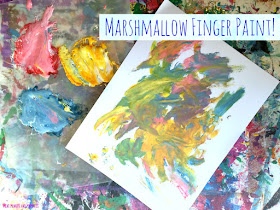
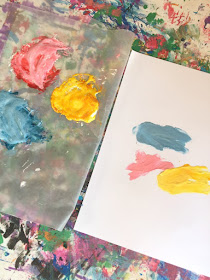

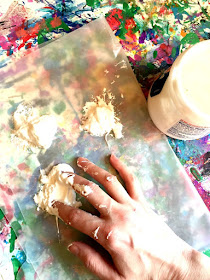
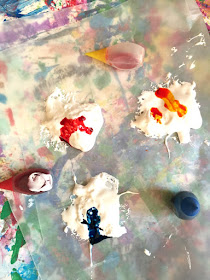
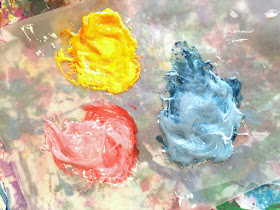
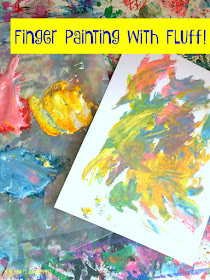
What messy and colorful fun! (Visiting from the Thoughtful Spot Blog Hop)
ReplyDeletei'm a big advocate of messy paint! Would love to see your posts in the Practical Mondays Link Up:)
ReplyDeleteMuch thanks for this awesome post Score hero mod apk Traffic rider mod apk Vector mod
ReplyDeleteThis particular papers fabulous, and My spouse and i enjoy each of the perform that you have placed into this. I’m sure that you will be making a really useful place. I has been additionally pleased. Good perform! Sol Control Custom auto tinting
ReplyDeleteNice to see this Color-Mixing with Marshmallow Finger Paint, which is looking so adorable for all the new generations but there are also very beneficial and authorized Assignment Writers UK, available for to giving you their best Assessments in all over the UK so realistically.
ReplyDeleteEdible marshmallow paint is a quick and easy way for kids to decorate cookies and marshmallows. Marshmallows, water, light corn syrup, and food coloring are all you need to make the most fun paint for kids ever.
ReplyDeleteThank you a lot for your fantastic post.
ReplyDeleteColor-mixing with Marshmallow Finger Paint is such a great hobby. Because a specific person creates this work. The university students celebrate the university convocation day, and they are decorated for university class for the Marshmallow Finger Paint. These students are very impressed with this activity, and students are writing do my assignment online about Marshmallow Finger Paint and his person.
ReplyDeleteUsing Color-mixing with Marshmallow Finger Paint is an enjoyable activity but we should take care in the way of writing in these types of articles because many people come daily to the site to have fun and read such articles. So they will be attracted and impressed with your words, so don't worry there is an ebook ghostwriting company that can assist you with their top-notch and valued content provided by some of their skilled writers.
ReplyDeleteFinger painting is very enjoyable activity which helps in releasing stress. I used my cousins marshmallow finger painting as an book cover of an novel with the help of ghostwriting agency at affordable rates. He was very happy to see his finger painting as an cover of a book.
ReplyDelete
ReplyDeleteUsing a book editor online has been incredibly helpful in refining my children's book on color-mixing with marshmallow finger paint. The editor ensured that the instructions were clear and engaging for young readers. It's a fantastic tool for authors who want to make their educational content both fun and accessible. Highly recommend for polishing your manuscript!
Nice to see this Color-Mixing with Marshmallow Finger Paint, which is looking so adorable for all the new generations but there are also very beneficial.This particular papers fabulous, and My spouse and i enjoy each of the perform that you have placed into this. I’m sure that you will be making a really useful place. I has been additionally pleased.
ReplyDeleteColor-mixing with marshmallow finger paint is a fun, creative activity for kids that sparks their imagination. Just like yellowstone clothing, which embodies the spirit of adventure and exploration, this playful art project encourages children to experiment and express themselves, fostering creativity while enjoying the tactile experience of vibrant colors and textures.
ReplyDeleteThis is the true face of talent and creativity which you can't find in the hands of the other TikTok popular artist. I'm a ghostwriter myself at Harvard Ghostwriting and when i see the true creativity behind the cover design, writing, and printing it's fills my heart just like you guys made.
ReplyDeleteAt Absolute Ghostwriting, we provide exceptional writing services through absolute write. Whether you're an aspiring author or a business professional, our expert team specializes in ghostwriting, editing, and publishing. From memoirs and novels to business books and self-help guides, we bring your ideas to life. With a personalized approach and a dedication to quality, we ensure your story is told with impact. Trust Absolute Write for a seamless writing experience that transforms your vision into a published masterpiece. Choose Absolute Ghostwriting for unparalleled storytelling expertise.
ReplyDeleteWith custom patches that meet all needs, Stitch Patches is dedicated to bringing creativity to life. with a focus on durability, care to detail, and vibrant, colorful design. Whether you need patches for events, your company, or your own use. We create unique patches. We offer excellent quality and premium manufacturing. Stitch Patches guarantees a hassle-free experience. Make the perfect patch now!
ReplyDelete